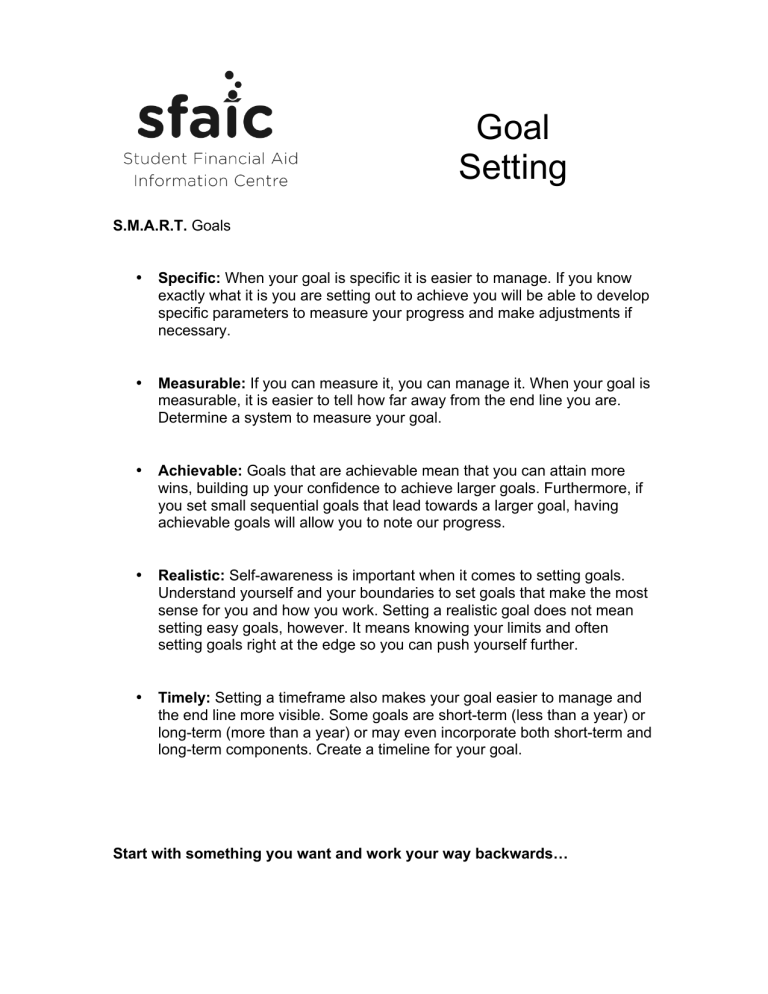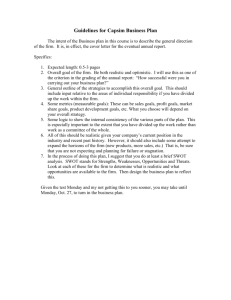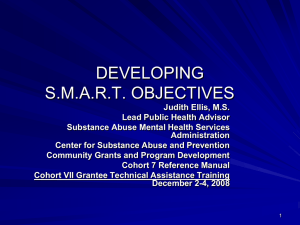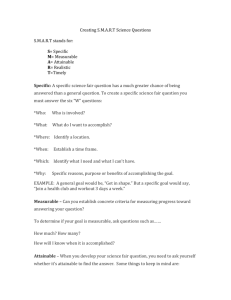Goal Setting

Goal
Setting
S.M.A.R.T.
Goals
•
Specific: When your goal is specific it is easier to manage. If you know exactly what it is you are setting out to achieve you will be able to develop specific parameters to measure your progress and make adjustments if necessary.
•
Measurable: If you can measure it, you can manage it. When your goal is measurable, it is easier to tell how far away from the end line you are.
Determine a system to measure your goal.
• Achievable: Goals that are achievable mean that you can attain more wins, building up your confidence to achieve larger goals. Furthermore, if you set small sequential goals that lead towards a larger goal, having achievable goals will allow you to note our progress.
•
Realistic: Self-awareness is important when it comes to setting goals.
Understand yourself and your boundaries to set goals that make the most sense for you and how you work. Setting a realistic goal does not mean setting easy goals, however. It means knowing your limits and often setting goals right at the edge so you can push yourself further.
•
Timely: Setting a timeframe also makes your goal easier to manage and the end line more visible. Some goals are short-term (less than a year) or long-term (more than a year) or may even incorporate both short-term and long-term components. Create a timeline for your goal.
Start with something you want and work your way backwards …
Example:
What did you want on the first day after winning the lottery?
To travel to Italy
What resources do you need to obtain this? How much will it cost?
I estimate the trip to cost around $5,000
What resources do you currently have available to you?
Income from employment
What is a realistic timeframe to achieve this goal within?
I would like to go to Italy in July 2014
How will you measure your progress?
Tracking the balance in my savings account
Setting the Goal:
1. What is your goal?
I plan to save $5,000 to travel to Italy in July 2014.
2. Do you foresee any obstacles to achieving this goal?
I am a student so my income is limited as it is. I’m very social and like to spend money on things like hanging out with my friends. I also value living an active lifestyle and I tend to spend a lot of money on fitness classes. I will have to book the flight for my trip sooner than May of 2014 so I will need to either ensure enough funds have been saved for the flight or find an alternate payment method.
3. When will you achieve this goal by?
What are the associated milestones you need to meet in order to achieve this goal?
Book a flight by January 2014. Have the spending money saved by May
4. How will you achieve this goal?
By taking $100 from each pay cheque receive and putting it into a savings account.
5. How will you measure your progress?
I will ensure this amount is included in my budget and transfer the $100 into a savings account every two weeks or $200 at the end of the month. I will have a monthly savings goal of $200 and will check the account balance each transfer to ensure an adequate amount of funds has been transferred.
6. How will you plan for unexpected expenses?
I will open a savings account for emergency expenses and deposit $100/month into it.
7. Can this goal be included in a monthly budget?
Yes, I can include a
$200 monthly expense into my budget.
Now give it a try!
What did you want on the first day after winning the lottery?
What resources do you need to obtain this?
What resources do you currently have available to you?
What is a realistic timeframe to achieve this goal within?
How will you measure your progress?
Setting the Goal:
1. What is your goal?
2. Do you foresee any obstacles to achieving this goal?
3. When will you achieve this goal by? What are the associated you need to meet in order to achieve this goal?
4. How will you achieve this goal?
5. How will you measure your progress?
6. How will you plan for unexpected expenses?
7. Can this goal be included in a monthly budget?









